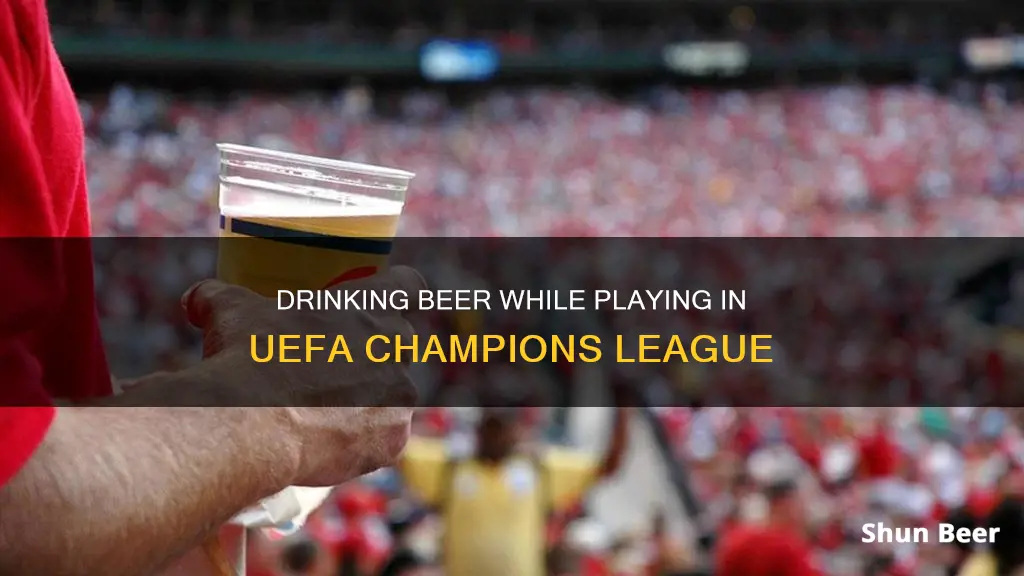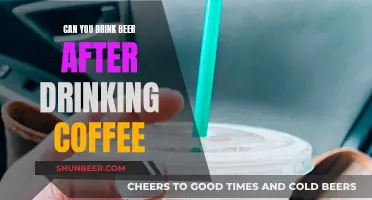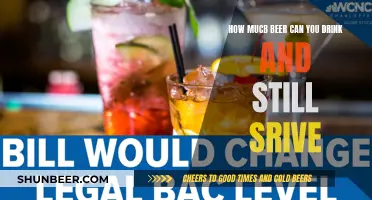
UEFA has lifted its ban on the sale of alcohol at Champions League and Europa League matches, allowing fans to buy and consume alcohol at stadiums from the 2018-19 season onwards. The decision was welcomed by Football Supporters Europe, who argued that the ban was paternalistic and that there was no evidence to suggest that banning alcohol in stadiums had any effect on reducing football-related disorder. However, the sale and consumption of alcohol will still be subject to local laws, meaning that in countries like England and Scotland, fans will not be allowed to drink in view of the pitch.
What You'll Learn
- UEFA reverses alcohol ban for Champions League matches
- Alcohol can be sold in countries that permit it, such as Germany
- In the UK, fans can buy alcohol but must consume it outside the stands
- The alcohol ban did not apply to VIP areas, creating a two-class society
- Alcohol restrictions are ineffective at reducing drunkenness among fans

UEFA reverses alcohol ban for Champions League matches
UEFA has lifted its ban on alcohol sales at Champions League and Europa League matches, allowing fans to buy alcohol at stadiums from the start of the 2018/19 season. The decision was made by UEFA's executive committee, amending Article 36 of its Safety and Security Regulations. The amended article now states:
> "The match organiser may only sell or distribute alcohol within the stadium or its private environs if and within the limits permitted under the national and local law as applicable from time to time."
This means that national and local laws will now prevail, so alcohol will be sold in countries that permit it, such as Germany, but not in those that do not, such as England. Previously, UEFA had forbidden the sale of any alcoholic drinks inside stadiums before and during Champions League and Europa League games.
The move has been welcomed by Football Supporters Europe (FSE), which has long argued against the ban. FSE CEO Ronan Evain said:
> "For a long time, football supporters have felt unfairly treated in comparison with fans of other sports like rugby, to say the least. It is not the sport you follow which makes you behave better or worse. Furthermore, the alcohol ban did not apply to VIP areas at football matches, causing a two-class society even within the stadia. Supporters felt that the alcohol banning policy was paternalistic, as there is absolutely no evidence or research to suggest that banning alcohol in a stadium has any bearing whatsoever on preventing or curtailing football-related disorder in and around it."
Evain also noted evidence that selling alcohol in stadiums can bring benefits, and that alcohol restrictions are ineffective at reducing drunkenness among fans. However, the change will not affect the law in Britain, where fans are not allowed to consume alcohol in view of the pitch. During games in the UK, fans can purchase alcohol on the stadium concourse but must consume it before taking their seats.
Cough Syrup and Beer: A Safe Combination?
You may want to see also

Alcohol can be sold in countries that permit it, such as Germany
UEFA has lifted its ban on the sale of alcohol at Champions League and Europa League matches. This means that, from the start of the 2018/19 season, fans will be able to buy alcohol at stadiums and drink in the stands throughout most European matches.
The amended Article 36 of UEFA's Safety and Security Regulations now reads:
> "The match organiser may only sell or distribute alcohol within the stadium or its private environs if and within the limits permitted under the national and local law as applicable from time to time."
This means that alcohol can be sold in countries that permit it, such as Germany. However, in countries with stricter alcohol laws, such as the UK, fans will only be allowed to consume alcohol in the wider stadium and not in the stands.
The change in regulations has been welcomed by Football Supporters Europe, an organisation representing fans across the continent. Ronan Evain, CEO of FSE, said:
> "For a long time, football supporters have felt unfairly treated in comparison with fans of other sports like rugby, to say the least. It is not the sport you follow which makes you behave better or worse. Furthermore, the alcohol ban did not apply to VIP areas at football matches, causing a two-class society even within the stadia. Supporters felt that the alcohol banning policy was paternalistic, as there is absolutely no evidence or research to suggest that banning alcohol in a stadium has any bearing whatsoever on preventing or curtailing football-related disorder in and around it."
Beer Slug Traps: Do They Work?
You may want to see also

In the UK, fans can buy alcohol but must consume it outside the stands
In June 2018, UEFA lifted its alcohol ban for Champions League and Europa League matches. This means that, in countries where it is legal, fans will be able to buy alcohol at stadiums and drink it while watching the game.
However, in the UK, while fans can now purchase alcohol at stadiums, they are not permitted to consume it within view of the pitch. This means that fans can buy drinks at the stadium concourse, but they must be consumed before taking a seat. This is due to UK law, which does not permit alcohol consumption in view of the pitch during football matches.
The change in UEFA's policy came after lobbying from Football Supporters Europe, who argued that the ban was unfair and unnecessary. In a statement, CEO Ronan Evain said that the ban made football supporters feel "unfairly treated in comparison with fans of other sports like rugby". He also pointed out that the ban did not apply to VIP areas, creating a "two-class society" within the stadiums. Evain also referenced research suggesting that alcohol restrictions do not effectively reduce drunkenness among fans and that other methods should be considered to tackle football hooliganism.
The amended article 36 of UEFA's Safety and Security Regulations now reads:
> “The match organiser may only sell or distribute alcohol within the stadium or its private environs if and within the limits permitted under the national and local law as applicable from time to time."
The Magic Behind Beer Machines: A Brewing Revolution
You may want to see also

The alcohol ban did not apply to VIP areas, creating a two-class society
UEFA has lifted its ban on alcohol at Champions League and Europa League matches, allowing fans to buy alcohol at stadiums from the 2018-2019 season. This means that national and local laws will now prevail—so alcohol will be sold in countries that permit it in the stands, such as Germany, but not in those that do not, such as England.
The amended article 36 of UEFA's Safety and Security Regulations now reads: “The match organiser may only sell or distribute alcohol within the stadium or its private environs if and within the limits permitted under the national and local law as applicable from time to time.”
The ban on alcohol in stadiums was originally put in place to curb hooliganism and violence. However, it has been criticised for being paternalistic and ineffective, as there is no evidence that banning alcohol in a stadium has any impact on preventing or reducing football-related disorder. In fact, alcohol companies are sponsors of major football teams and tournaments, and drinking cultures have existed within football clubs.
> "For a long time, football supporters have felt unfairly treated in comparison with fans of other sports like rugby, to say the least. It is not the sport you follow which makes you behave better or worse. Furthermore, the alcohol ban did not apply to VIP areas at football matches, causing a two-class society even within the stadia. Supporters felt that the alcohol banning policy was paternalistic, as there is absolutely no evidence or research to suggest that banning alcohol in a stadium has any bearing whatsoever on preventing or curtailing football-related disorder in and around it."
Is Old Beer Safe to Drink?
You may want to see also

Alcohol restrictions are ineffective at reducing drunkenness among fans
The consumption of alcohol in football stadiums has been a topic of debate for years, with UEFA lifting its alcohol ban for Champions League and Europa League matches in 2018. This decision was welcomed by Football Supporters Europe, an organization representing fans across the continent. Ronan Evain, CEO of FSE, stated that football supporters had "felt unfairly treated in comparison with fans of other sports like rugby". He also highlighted the existence of a "two-class society" within stadiums, as the alcohol ban did not apply to VIP areas. Evain further criticized the alcohol banning policy as "paternalistic", arguing that there is no evidence to suggest that banning alcohol in stadiums has any impact on preventing or reducing football-related disorder.
While UEFA's decision to lift the alcohol ban gives match organizers the option to distribute alcohol if local laws permit it, national and local laws still take precedence. For example, in the UK, fans can purchase alcohol at stadiums but are restricted from consuming it within view of the pitch. Similarly, in Scotland, alcohol is banned in all areas of football grounds except for corporate hospitality. In contrast, countries like Germany allow the sale and consumption of alcohol in the stands during football matches.
The debate around alcohol restrictions in football stadiums is complex and multifaceted. While some argue that alcohol restrictions can help curb hooliganism and crowd disorder, others highlight the ineffectiveness of such measures in reducing drunkenness among fans. Ultimately, the impact of alcohol restrictions on fan behavior may vary depending on cultural contexts, national and local laws, and the specific dynamics of different sports.
Beer and Omeprazole: Is It Safe to Drink?
You may want to see also
Frequently asked questions
Yes, UEFA has lifted the alcohol ban at Champions League matches, allowing fans to buy and consume alcohol at stadiums where local and national laws permit it.
While UEFA has lifted the alcohol ban, local laws in the UK dictate that fans at football matches are not allowed to consume alcohol in view of the pitch. Fans can purchase alcohol at the stadium concourse but must consume it before taking their seats.
Yes, beer will be sold at German grounds during Champions League matches.
No, due to France's Loi Évin passed in 1991, it is illegal to use sponsorship to promote alcohol. Visiting teams must remove alcohol branding from their kits, and alcohol cannot be consumed at the stadium.







